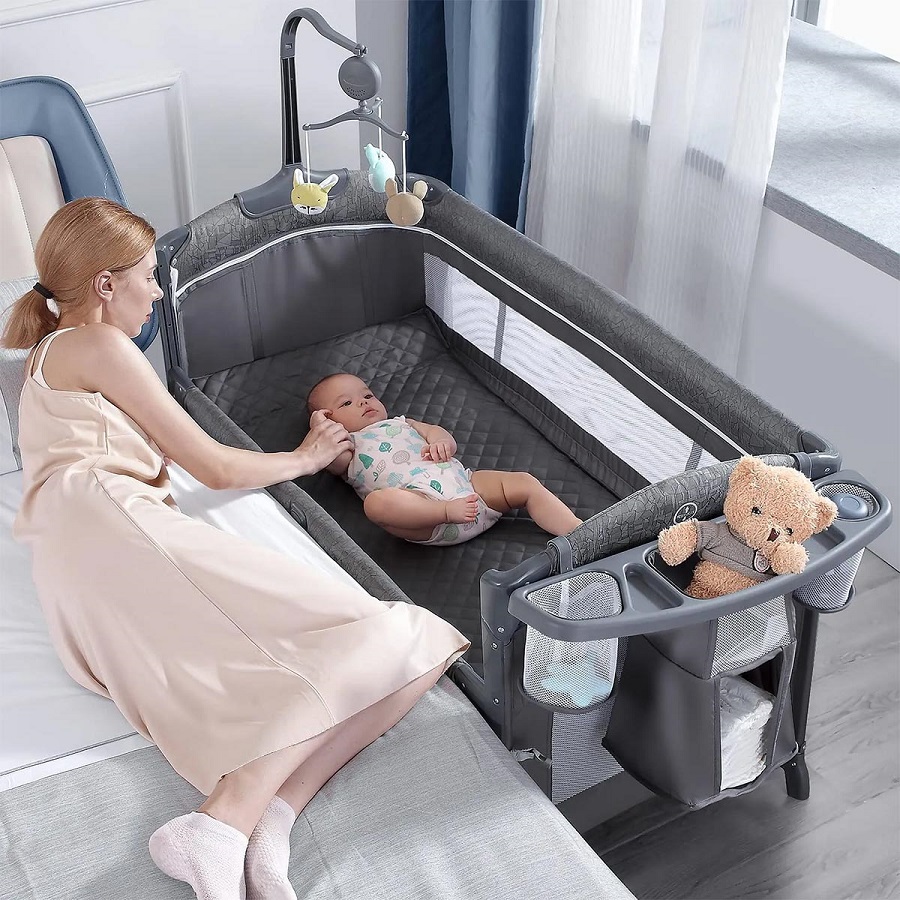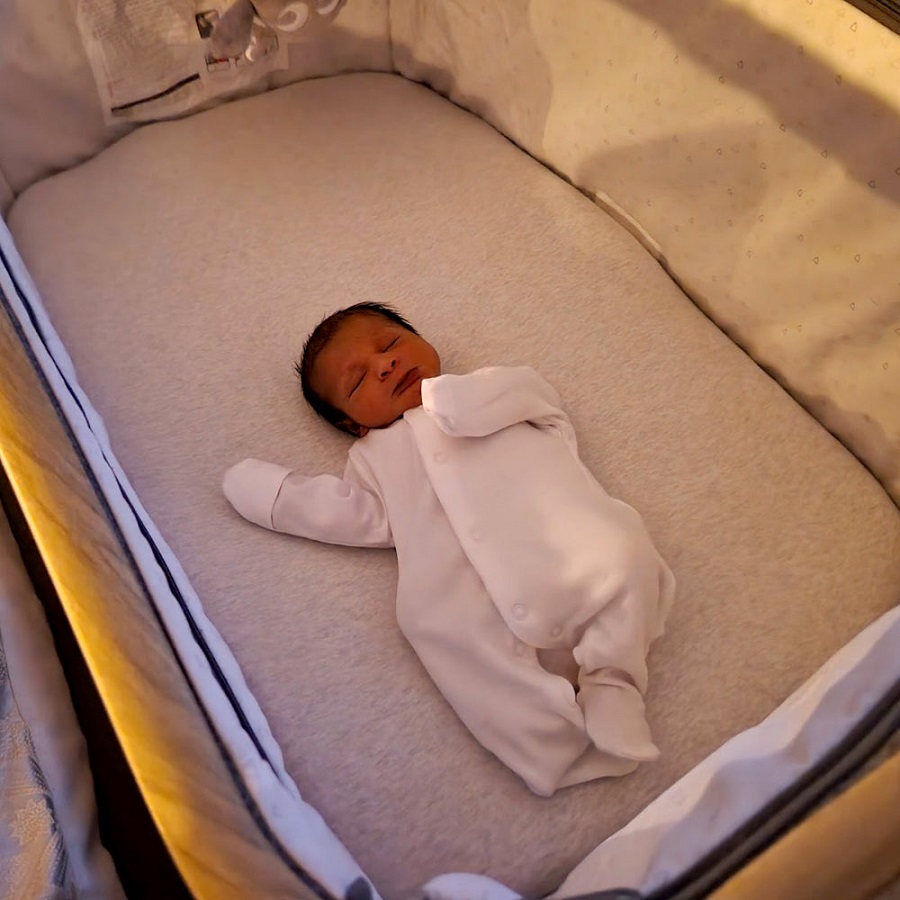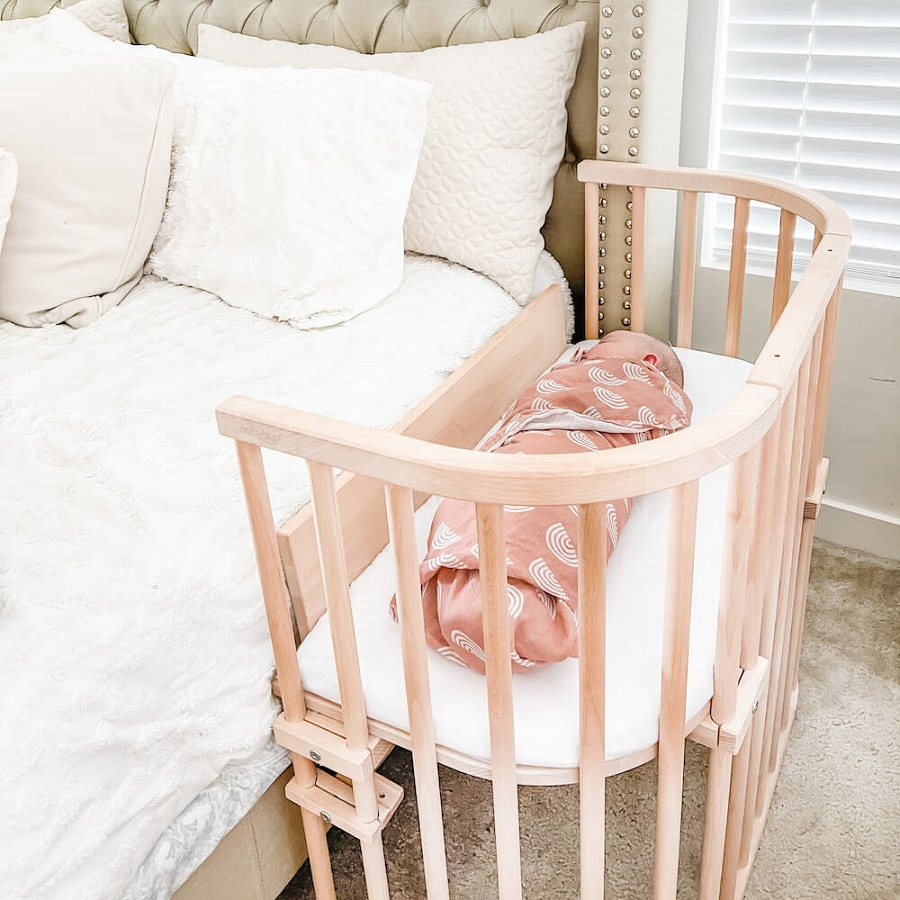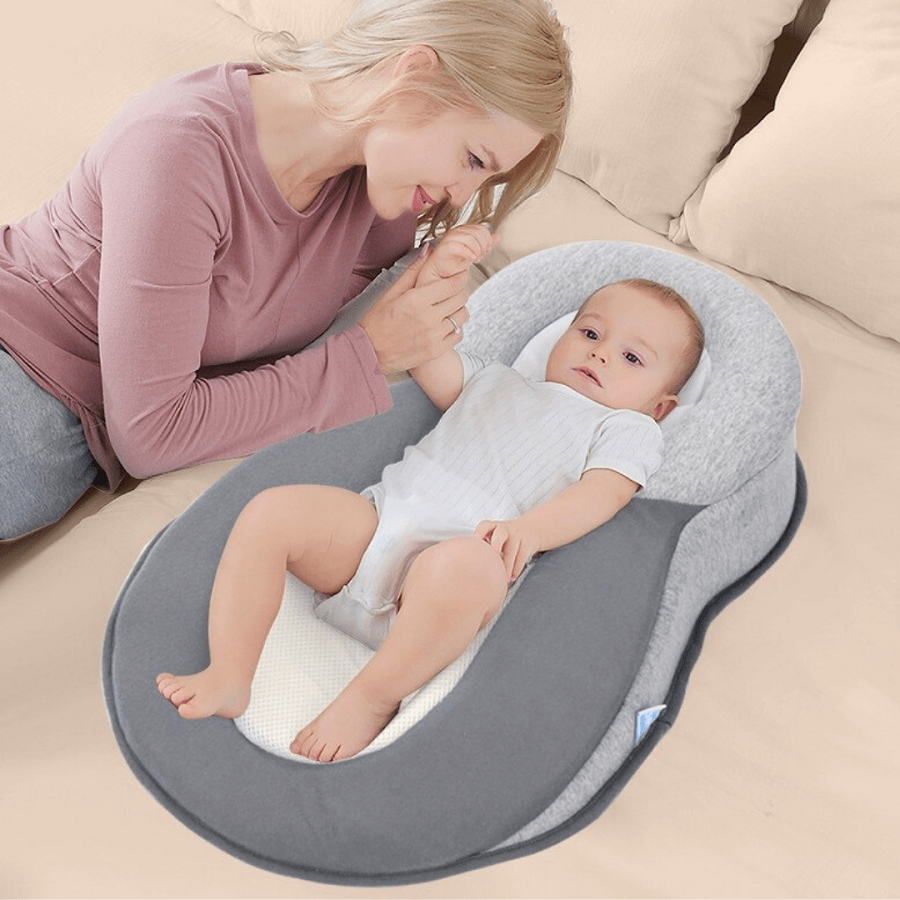Immediate Response to a Fall
Discovering your baby has taken a tumble off the bed can be alarming. The first thing to do is remain calm so you can respond appropriately. Approach your baby amwncl;yp, and check if they are conscious and breathing. Offer comfort immediately; your presence can be very soothing amidst their confusion and potential pain.
If your baby fell off the bed onto carpet, the soft landing might reduce the severity of injuries. However, you should still inspect them for any signs of distress or injury. Gently assess your baby by looking for visible cuts, bruises, or bumps. Avoid moving them abruptly, especially if they seem dazed or confused, as this could exacerbate potential injuries.
Next, observe their behavior. Are they crying? If so, this can actually be a good sign as it indicates they are alert and able to express themselves. However, the crying should not persist unremittingly for an extended period. If this occurs, or if your baby isn’t acting normally, it’s time to consider seeking medical attention.
Call your pediatrician or go to the nearest emergency room if you notice anything concerning during your initial assessment or if your intuition tells you something’s not right. They can provide direct guidance based on the situation. Meanwhile, keep your baby in a safe, contained space where they can’t fall again and stay close to monitor their condition continuously.
Always err on the side of caution when it comes to falls. It’s better to get a professional opinion even if you think the fall wasn’t severe, especially for babies as they cannot vocalize the extent of their discomfort or pain.

Assessing Your Baby’s Condition
After ensuring your baby is conscious and breathing following a fall off the bed, it’s crucial to assess his or her condition further. Even if a soft carpet cushioned the fall, vigilance is important. Start by gently examining your baby for bruises, cuts, or bumps. Look specifically for any signs of distress that could suggest internal injuries. Keep in mind to handle your baby carefully to avoid additional harm.
Next, monitor your baby’s behavior and movements. Is the baby moving all limbs normally? Does he or she recognize you and engage with surroundings? This can indicate your baby is responding well despite the fall. Additionally, observe your baby’s mood and alertness levels. Changes in this might hint at discomfort or pain.
Finally, if your baby fell off bed onto carpet and appears unharmed, continuously watch them for any delayed symptoms that might manifest. These can include changes in feeding patterns, persistent crying, changes in sleep habits, or uncharacteristic irritability. If you notice any such symptoms or if something feels off, seek medical advice without delay.
It’s paramount to trust your instincts as a parent. If something doesn’t feel right about your baby’s condition post-fall, it’s best to consult with a healthcare professional. They can provide tailored advice or care based on the specifics of the incident and your baby’s health history.
Recognizing the Signs of a Serious Injury
After a baby falls, it is critical to spot any signs that point to a severe injury. First, look for any abnormal body or head shape changes, like swellings or bumps. These could indicate internal issues. Keep an eye out for any fluids, like blood or a clear liquid from the nose or ears, which could suggest more serious harm.
Pay attention to your baby’s consciousness level. If they seem unusually sleepy or won’t wake up, this could be a red flag. Likewise, persistent crying that doesn’t settle after comforting or a cry that sounds abnormal may also be a sign that reflects significant distress or pain.
Look into their eyes. Pupils of unequal sizes can be a telling sign of a serious head injury. Also, observe their movements. If they’re unable to move their limbs normally or seem to have trouble with balance or coordination, these are potential indicators of an injury that requires immediate attention.
Unexpected vomiting, especially more than once, or any seizures are signs that a doctor should assess your baby as soon as possible. Difficulty with regular activities, like feeding or playing, can also indicate that the fall may have had more impact than initially thought.
If you spot any of these signs, or if your intuition suggests that something isn’t right, don’t hesitate to seek medical help immediately. Quick action is vital when handling potential serious injuries after a fall.
Home Care for Minor Bumps and Bruises
When your baby experiences a minor fall and ends up with bumps or bruises, home care can be simple. First, keep an ice pack ready. Wrap it in a thin cloth and apply to the bump gently. Do this for about 20 minutes. It helps reduce swelling and soothes the pain.
Next, comfort your baby. Cuddles and soothing words can calm them down. It also distracts them from any discomfort they may feel. Watch how they play and move afterward. Normal behavior usually means the fall was minor.
Give proper pain relief if needed. Acetaminophen or ibuprofen can help, but only use the correct dose for their age. Never give aspirin to children; it’s dangerous for them.
Finally, make sure they rest. A quiet and calm environment helps them recover. Avoid rough play or activities that might jostle them again.
Keep an eye on your baby for the next 24 hours. Look for any changes in behavior or signs of pain. If in doubt, call your pediatrician. It’s always best to be sure when it comes to your baby’s health after a fall, even if the baby fell off bed onto carpet.

When to Visit the Doctor or Emergency Room
After your baby falls, sometimes it’s clear that a doctor’s visit is necessary. Here are key times to seek help:
- If you notice any severe swelling, deep cuts, or if the baby shows any signs of a broken bone, a trip to the emergency room is in order.
- Should your baby act drowsy or lose consciousness, even for a second, it’s critical to get medical care right away.
- Look for fluids like blood or clear liquid coming from the nose or ears. This situation requires immediate medical attention.
- If your baby has uneven pupil sizes or won’t respond to your voice or touch, contact a healthcare professional without delay.
- Continuous crying, more than the usual fussiness, or a high-pitched scream are signs that you should visit the doctor.
When in doubt, always err on the safe side and consult with a pediatrician or go to the nearest emergency room. Especially if the baby fell off the bed onto carpet and is showing unusual symptoms, it’s always better to be cautious and ensure your baby’s health and safety.
Concussion Awareness and Symptoms
When a baby falls, especially onto a surface like carpet, monitoring them for a concussion is important. A concussion is a type of brain injury that can occur even if a fall doesn’t seem severe. Watch your baby for signs that may indicate a concussion following the incident.
Recognize Concussion Symptoms
Symptoms of a concussion can be subtle and may not appear right away. Be on the lookout for:
- Repeat vomiting or nausea.
- Trouble with balancing or walking.
- Changes in eating or sleeping habits.
- Unusual crankiness or mood swings.
- No interest in favorite toys or activities.
- A blank stare or dazed appearance.
Immediate Actions if Concussion is Suspected
If you suspect your baby has a concussion after a fall, even if they fell off bed onto carpet, take immediate steps:
- Do not move your baby roughly.
- Avoid letting them sleep for long periods without checks.
- Call your pediatrician for an urgent appointment.
- If serious symptoms arise, go to the emergency room.
Remember, when in doubt, it is always safest to consult a healthcare provider.
Tips for Fall Prevention
The safety of your baby is paramount. To prevent falls, always use vigilance. Here are some key tips to minimize the risk of your baby falling off the bed onto carpet or other surfaces:
- Never leave your baby unattended on an elevated surface. Babies move unpredictably and can quickly end up in danger.
- Use safety rails on beds or changing tables. They can provide a barrier against accidental falls.
- Keep the floor clutter-free. Toys or loose items can cause you to trip while holding your baby.
- Opt for a low bed or play mats. The closer your baby is to the ground, the less impactful a fall will be.
- Stay within arm’s reach when your baby is on furniture. React swiftly if they start to roll or shift.
- Consider floor-based play time. Activities on the floor are the safest for your baby.
- Regularly check baby-proofing measures. Make sure gates and guards are secure and effective.
Remember, falls can happen but taking proactive steps greatly reduces the risk. Always supervise your baby and ensure their play area is safe. By following these tips, you’ll provide a safer environment and peace of mind.

Monitoring Your Baby Post-Fall
After your baby falls, watch them closely. Look for any late signs of injury. Symptoms can show up hours later. Keep an eye out for changes in their eating, sleeping, or behavior. This is crucial even if the baby fell off bed onto carpet.
Check on them often, especially during naps or overnight. Waking them gently every few hours can be wise. It helps you know they’re okay. If they’re hard to wake, see a doctor right away.
Stay in the same room that first night. This lets you monitor them closely. If your baby is restless or has trouble sleeping, it may signal pain or discomfort.
Keep a log of anything unusual. Write down any odd movements or cries. Note if they seem confused or not like themselves. Share this with a doctor if needed.
If symptoms get worse or new ones appear, get medical help fast. Don’t wait. Babies can’t tell us how they feel. It’s up to us to notice and act on any problems.
Remember, your close observation is vital. You know your baby best. Trust your instincts. If something seems off, contact your pediatrician. Safety is always the top priority.
